人教新目标版七年级英语下册 Unit 12 What time do you go to school(第4课时)优质教案
人教新目标版初中英语七年级下册单项选择专项练习(含答案)

七下单选专练及答案(Unit1)1. —Can Tim play _________ chess? —Yes. And he can play _______ drums, too.A. the; theB. the; 不填C. 不填; theD. 不填;不填2. I always help my sister _________ her history.A. withB. ofC. forD. in3. —Can you sing _________ dance, Gina? —I can sing, Miss Xu.A. orB. andC. butD. because4. Hello, Linda! You can _________ a student in our school.A. amB. isC. areD. be5. He can _________. He wants to join the art club.A. swimB. drawC. writeD. sing6. Clark is a teacher and he _________ Chinese.A. teachesB. watchesC. asksD. calls7. —Can you _________ English?—Yes, I can.A. sayB. speakC. talkD. tell8. —_________? —Yes, he can.A. What can Victor doB. Can I join the clubC. What can I doD. Can Victor join the club9. —Can you play the violin?—_________. But I can play the piano.A. Yes, I canB. Yes, I doC. No, I don’tD. No, I can’t10. —What can Bob do? —He _________.A. can sing and danceB. plays volleyball wellC. likes soccer very muchD. wants to be in our club(Unit2)11. Paul usually has breakfast ______ seven o’clock.A. inB. atC. onD. for12. Alan always gets up late and then goes to school, so he ______ eats breakfast.A. alwaysB. usuallyC. neverD. sometimes13. There are _______ people in the park to day.A. a lotB. lot ofC. lots ofD. much14. What ______ your father usually do after work?A. isB. doC. doesD. am15. —______ do you go to school every day?—I go to school at half past seven.A. WhereB. WhoC. WhatD. When16. I like the beef soup because it ______ nice.A. tastesB. soundsC. looksD. gets17. We need to ______ after eating to have good teeth.A. get upB. brush our teethC. get dressedD. do our homework18. Sam has a relaxing ______. He only works on weekends.A. showB. jobC. familyD. subject19. —What’s the English for 8:10?—It’s ______.A. eight tenB. ten eightC. ten to eightD. eight past ten20. —What time do you take a walk in the morning?—______.A. On weekendsB. With my friendsC. At about 6:30D. For an hour(Unit3)21. Peter usually goes to school by ______ bus.A. aB. anC. theD. 不填22. My English teacher is very good. She is like my mother ______ me.A. toB. forC. withD. of23. —______ does your father go to work?—He rides his bike.A. WhereB. WhenC. HowD. Why24. The train ______ the train station at 8:40 every morning.A. crossesB. runsC. leavesD. comes25. —______ is it from your school to the train station?—Five kilometers.A. How’sB. How oldC. How longD. How far26. For some students, it’s difficult ______ school.A. to get toB. get toC. to getD. get27. Sam has a bike. He ______ it to school every day.A. takesB. ridesC. walksD. drives28. —Does Peter walk home?—______. He takes the bus.A. No, he doesn’tB. Yes, he doesC. No, he isn’tD. Yes, he is29. —How long does it take you to go to the bus station? —______.A. About twenty kilometersB. I ride my bikeC. About half an hour by subwayD. I get there quickly30. —Have a good day at school, Susan! —______.A. Me, tooB. You, tooC. ByeD. Fine(Unit4)31. ______ look outside, Bruce. Look at the blackboard.A. NotB. Don’tC. Can’tD. Doesn’t32. I have ______ rules at home.A. too manyB. too muchC. much tooD. many too33. There are some rules in our school. We must ______ them.A. readB. followC. getD. take34. —Let’s go out to play.—Sorry, I must ______ the piano now.A. makeB. practiceC. listenD. exercise35. The room is ______. Let’s clean it now.A. dirtyB. smallC. bigD. clean36. Nancy can’t come here, because she ______ do he r homework.A. has toB. can’tC. doesn’t have toD. can37. —Are they in the ______? —Yes. They are eating lunch there.A. libraryB. music roomC. clubD. dining hall38. —______? —I have to learn to play the guitar.A. What do you haveB. What do you have to doC. What do you doD. What you have to do39. His father is strict ______ him.A. ofB. inC. withD. from40. —Does she have to wear the school uniform today?—______. It’s Sunday today. She just has to wear it on school days.A. No, she doesn’tB. Yes, she doesC. Yes, she hasD. No, she hasn’t(Unit5)41. This is ______ elephant. ______ elephant is from Africa.A. an; AnB. an; TheC. the; TheD. the; An42. I like pandas because they are ______ friendly.A. kindB. a kind ofC. kinds ofD. kind of43. —Why do you think lions are ______?—Because they usually sleep all day.A. lazyB. scaryC. cuteD. beautiful44. Grace is a ______ girl. She doesn’t like meeting new friends.A. tidyB. shyC. strictD. friendly45. —What ______ does Tina like? —She likes dogs and tigers.A. subjectsB. colorsC. sportsD. animals46. Why ______ you go to the zoo with us?A. don’tB. aren’tC. notD. no47. Animals are our friends and let’s ______ them.A. saveB. forgetC. killD. learn48. This is Linda. She ______ America.A. come fromB. is fromC. comesD. is49. He often helps his mother ______ dinner.A. makesB. makeC. makingD. made50. —______? —Because they are very interesting.A. How do you like giraffesB. When do you see giraffesC. Where do you find giraffesD. Why do you like giraffes(Unit6)51. Jim and Tim are talking _______ the phone.A. atB. onC. withD. in52. Today is Sunday. My family _______ all at home.A. amB. isC. areD. be53. It’s ten o’clock in the morning. Dale _______ for a test.A. studyB. studiesC. studyingD. is studying54. Look! The children are swimming in the _______.A. zooB. supermarketC. libraryD. pool55. —What do you like to _______?—Some orange juice.A. eatB. drinkC. watchD. clean56. He wishes ______ his parents.A. meetB. meetingC. to meetD. meets57. Your clothes are dirty. Please _______ them on weekends.A. saveB. leaveC. wearD. wash58. —_______ she _______ her homework?—No, she isn’t. She is writing something.A. Does; doB. Is; doingC. Do; doD. Are; doing59. —What time is it now? —_______.A. In the morningB. It’s eightC. It’s in MayD. On Tuesday60. —_______? —They are playing basketball.A. What are they doingB. What do they doC. How are theyD. Where are they playing(Unit7)61. My family are ______ a vacation in Dalian.A. forB. inC. atD. on62. Parents hope their children study ______ at school.A. againB. earlyC. hardD. soon63. Today I want to drive to work but my car doesn’t ______.A. workB. walkC. runD. go64. Dale, are you having a good time ______ the village?A. visitB. to visitC. visitsD. visiting65. ______ it going?A. How’sB. What’sC. What doesD. How does66. There is lots of ______ in this place in summer.A. snowB. snowyC. rainD. rainy67. Could you tell her ______ to me?A. writeB. writesC. writingD. to write68. Look! Some boys ______ soccer there.A. playingB. are playingC. to playD. play69. —______?—They are studying.A. What are they doingB. Where are theyC. How are theyD. What do they do70. —How’s the weather in Boston? —______.A. Sounds goodB. Fine, thank youC. That’s rightD. It’s wi ndy(Unit8)71. The post office is ______ Center Street.A. inB. onC. atD. from72. It’s ______ the post office ______ the library.A. between, andB. from, toC. between, orD. next, to73. My uncle can’t buy the car because he doesn’t have much ______.A. timeB. moneyC. healthD. luck74. I usually spend two hours ______ books every day.A. readB. readsC. readingD. to read75. Look! The monkey is ______ that big tree.A. climbingB. walkingC. runningD. sitting76. His grandpa enjoys ______ tennis.A. playB. playsC. to playD. playing77. There ______ a book and two pens on the desk..A. beB. isC. areD. have78. —Where’s the pay phone?—______.A. It’s black and whiteB. It’s interestingC. It’s next to the bankD. It’s very delicious79. —Are there any books in the bookcase? —______. They are English books.A. Yes, there areB. No, there aren’tC. Yes, they areD. No, they aren’t80. Go ______ the street and turn right ______ Bridge Street.A. along, onB. straight, atC. straight, onD. down at(Unit9)81. Does Mary have long ______ short hair?A. withB. orC. andD. for82. —I can’t see the things there.—You can wear your ______.A. glassesB. sweaterC. hatD. shoes83. Bob wants to go to the _____ to see a movie.A. restaurantB. cinemaC. hospitalD. shop84. Can you tell me where Mr. Smith _____?A. livingB. liveC. livesD. to live85. Each of the students ______ his homework on time.A. doingB. to doC. doD. does86. Alice is ______, because she eats a little.A. lazyB. funnyC. cleverD. thin87. She ______ black hair and she ______ of medium height.A. has, hasB. is, hasC. is, isD. has, is88. The American girl has ______ hair.A. long blondeB. blonde longC. a long blondeD. a blonde long89. —Is Mrs. Brown short? —______. But her son is very tall.A. Yes, she isB. No, she isn’tC. No,she doesn’tD. Yes, she does90. —______? —He is short and has long hair.A. How is AlanB. What does Alan look likeC. Where is AlanD. What does Alan like(Unit10)91. I would like ______ in the restaurant.A. eatingB. eatC. to eatD. eats92. Peter doesn’t like apples, chicken ______ mutton.A. andB. withC. orD. of93. — What ______ bowl of noodles would you like?— Large, please.A. priceB. kindC. sizeD. color94. We have some ______ here and we can make ______ soup.A. egg; eggB. egg; eggsC. eggs; eggsD. eggs; egg95. Skating is getting ______ now. Many people like to skate.A. importantB. difficultC. popularD. funny96. Anna, please ______ the meat and then cook it.A. cut upB. blow outC. cut downD. eat out97. —Do you have ______ beef?—Sorry, we don’t. But we have ______ mutton.A. any; someB. any; anyC. some; anyD. some; some98. — ______? — Beef noodles.A. How much are the beef noodlesB. What kind of noodles would you likeC. What size would you likeD. How about beef noodles99. — Would you like some dumplings?— ______.A. Yes, pleaseB. It’s interestingC. You’re welcomeD. No problem 100. — May I have your order?— ______.A. No, you can’tB. Have a good timeC. You, tooD. I’d like some rice, please(Unit11)101. We learned a lot ______ animals in the zoo.A. inB. withC. aboutD. for102. I want to know ______ to make a model plane.A. whoB. whereC. whatD. how103. I ______ a student last year but now I ______ a teacher.A. am; amB. was; amC. am; wasD. was; was104. His uncle is good at farming. He works on a ______.A. hospitalB. bankC. farmD. hotel105. —Were you at home ______?—No, I weren’t.A. yesterdayB. every dayC. next MondayD. now106. They can’t see ______ in the dark.A. somethingB. anythingC. everythingD. nothing107. Amy helped her grandma ______ the cat this morning.A. blowB. feedC. pickD. milk108. All of you, be quiet! I can’t ______ the teacher.A. watchB. seeC. hearD. listen109. —How was Tim’s trip?—______.A. It is OKB. He was fineC. It was greatD. He had a trip110. —Did he visit the museum last Sunday? —______. He played the piano.A. Yes, he didB. No, he didn’tC. Yes, he doesD. No, he doesn’t(Unit12)111. My uncle worked ______ a farmer on a farm two years ago.A. forB. ofC. asD. with112. Mother was ______ after work, so she went to sleep early.A. lazyB. tiredC. luckyD. friendly113. There are seven ______ in the picture.A. sheepB. cowC. horseD. chicken114. Look! A plane ______ in the sky.A. fliesB. flewC. flyingD. is flying115. —Where ______ you yesterday morning? —I ______ at my uncle’s home. A. were; am B. are; am C. are; was D. were; was 116. We saw some people ______ in the park.A. exercisingB. exercisesC. to exerciseD. to exercising 117. Who ______ this morning?A. woke up himB. woke him upC. wakes up himD. wakes him up 118. —______ did you go to Beijing? —By train.A. HowB. WhenC. WhereD. Why 119. —Did they visit the high school? —______. They said it was great.A. Yes, they doB. No, they didn’tC. Yes, they didD. No, they don’t 120. —______? —They went to summer camp.A. When did they go campingB. Where were they campingC. What did they do on vacationD. Why did they go on vacation参考答案1-10 CAADB ABDDA 11-20 BCCCD ABBAC 21-30 DACCD ABACB 31-40 BABBA ADBCA 41-50 BDABD AABCD 51-60 BCDDB CDBBA 61-70 DCADA CDBAD 71-80 BABCA DBCAA 81-90 BABCD DDAAB 91-100 CCCDC AABAD 101-110 CDBCA BBCCB 111-120 CBADD ABACC。
新目标版英语七年级下册 Unit12Whatdidyo Udolastweekend?同步练习及答案
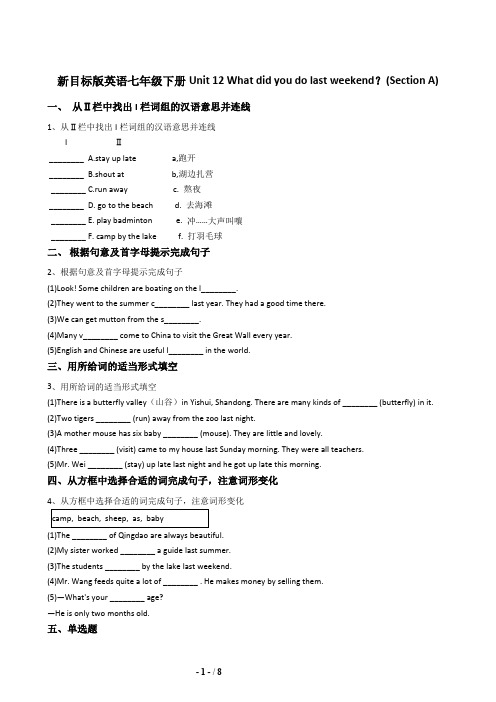
新目标版英语七年级下册Unit 12 What did you do last weekend?(Section A)一、从Ⅱ栏中找出I栏词组的汉语意思并连线1、从Ⅱ栏中找出I栏词组的汉语意思并连线I Ⅱ________ A.stay up late a,跑开________ B.shout at b,湖边扎营________ C.run away c. 熬夜________ D. go to the beach d. 去海滩________ E. play badminton e. 冲……大声叫嚷________ F. camp by the lake f. 打羽毛球二、根据句意及首字母提示完成句子2、根据句意及首字母提示完成句子(1)Look! Some children are boating on the l________.(2)They went to the summer c________ last year. They had a good time there.(3)We can get mutton from the s________.(4)Many v________ come to China to visit the Great Wall every year.(5)English and Chinese are useful l________ in the world.三、用所给词的适当形式填空3、用所给词的适当形式填空(1)There is a butterfly valley(山谷)in Yishui, Shandong. There are many kinds of ________ (butterfly) in it.(2)Two tigers ________ (run) away from the zoo last night.(3)A mother mouse has six baby ________ (mouse). They are little and lovely.(4)Three ________ (visit) came to my house last Sunday morning. They were all teachers.(5)Mr. Wei ________ (stay) up late last night and he got up late this morning.四、从方框中选择合适的词完成句子,注意词形变化4、从方框中选择合适的词完成句子,注意词形变化camp, beach, sheep, as, baby(1)The ________ of Qingdao are always beautiful.(2)My sister worked ________ a guide last summer.(3)The students ________ by the lake last weekend.(4)Mr. Wang feeds quite a lot of ________ . He makes money by selling them.(5)—What's your ________ age?—He is only two months old.五、单选题5、Tom usually goes fishing __________ Sunday morning.A、atB、onC、forD、in6、—Hello, Mum. Are you still on Lushan Mountain?—Oh, no. We are back home. We __________ a really good journey.A、haveB、hadC、are havingD、will have7、—__________ did he visit last summer?—Sydney.A、WhatB、WhenC、WhoD、Where8、Mr. Jackson keeps lots of __________ on his farm.A、sheepB、chickenC、gooseD、pandas9、—What did you do yesterday evening, Gina?—I __________Titanic 3D in the City Cinema.A、watchB、watchedC、am watchingD、will watch10、—__________ did you visit the Science Museum?—Three months ago.A、WhenB、WhereC、WhatD、Which11、I worked __________a waiter (侍者) in a hotel last winter.A、toB、forC、andD、as12、They were all very __________, but none (一个没有) of them took a rest.A、happyB、excitedC、tiredD、relaxed13、—Have you had your breakfast yet?—Yes, Mom __________ it for me.A、was cookingB、is cookingC、will cookD、cooked14、—Who fed so many cows?—My uncle __________.A、doB、doesC、didD、doing六、根据汉语提示完成句子15、根据汉语提示完成句子(1)Mr. Sun and his family visited the ________ ________ ________ (自然历史博物馆).(2)My son often ________ ________ ________ (熬夜) last summer vacation.(3)That boy ________ ________ (跑开) when he saw the police.(4)Don't ________ ________ (冲……大声叫嚷) the ________ (婴儿). She is too young.(5)The ________ (耗子) has their own (自己的) ________ (语言).七、对画线部分提问16、对画线部分提问(1)Jim played the guitar last night.________ ________ Jim ________ last night?(2)They went to Canada last week.________ ________ they ________ last week?(3)My school trip was great.________ was ________ school trip?(4)I played soccer with my classmates last Sunday.________ ________ you ________ soccer with last Sunday?(5)Jim went to the cinema yesterday.________ went to the cinema yesterday?八、补全对话17、补全对话A. Who did you go there with?B. When did you go there?C. Yes, we did.D. Where did you go last weekend,Vera?E. How was your weekend?M: ________(1) W: I went to Hangzhou and Suzhou.M: ________(2) W: On October 3rd.M: ________(3) W: My parents, my aunt and uncle.M: ________(4) W: It was excellent.M: Oh, great! Did you take any photos there?W: ________(5)M: Let me have a look at them when they come out (冲印出来). W: Sure.九、任务型阅读18、任务型阅读John had a busy weekend. On Saturday morning, he went to the library and studied math. On Saturday afternoon, he went to the park. He played tennis with his friend. Lisa was busy on Saturday, too. She cleaned her room in the morning. In the afternoon, she wrote a letter to her cousin(表妹).On Sunday morning, John and Lisa read books at home. On Sunday afternoon, they practiced English. In the evening, they saw an interesting talk show with their parents. They had great fun.(1)John went to the library and studied math. Lisa cleaned her room.(2)Who did John play tennis with?(3)When did Lisa write a letter?(4)在短文中找出下列动词的过去式have ________ is________ see________ read________ write________(5)把短文中画线句子翻译成汉语答案解析部分一、从Ⅱ栏中找出I栏词组的汉语意思并连线1、【答案】C①E②A③D④F⑤B【解析】【分析】考查短语的英汉互译,注意以下几个:A 中用late,不是later;B中用at而不是to;E中不能加任何冠词。
人教版新目标七年级下册Unit1_12重点短语及句型归纳
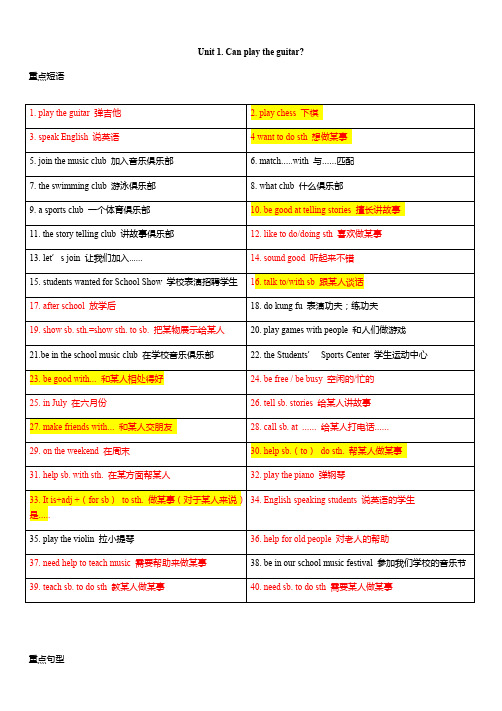
Unit 1. Can play the guitar?重点短语重点句型1. —Can you swim?你会游泳吗?—No,I can’t.不,我不会。
2. Can you play the guitar?你会弹吉他吗?3. I want to join the art club.我想参加艺术俱乐部.4. What club do you want to join?你想参加什么俱乐部?5. You are very good at telling stories.你非常擅长讲故事。
6. Sounds good. But I like to draw,too.听起来不错。
但我也喜欢画画。
7. Then join two clubs—the story telling club and the art club!那么就请加人两个俱乐部——讲故事俱乐部和艺术俱乐部。
8. 一Can Wu Jun speak English?吴俊会讲英语吗?一No,he can’t, but he can speak Chinese.不会,但他会讲汉语。
9. Are you good with old people?你与老人们相处得融洽吗?10. Can you play the piano or the violin?你会弹钢琴还是会拉小提琴?Unit 2 What time do you go to school?重点短语重点句型1. What time do you go to school?你几点去上学?2. 一What time do you usually take a shower,Kick?瑞克,你通常几点钟淋浴?—I usually take a shower at six forty.我通常六点四十淋浴。
3. 一When do you go to work? 你什么时候去上班?一At eleven o’clock, so I’m never late for work.十一点,我上班从来没有迟到4. —What time do they get dressed?他们几点钟穿上衣服?一They always get dressed at seven twenty.他们总是七点二十穿上衣服。
2019-2020学年人教新目标英语七年级下册Unit 12 What did you do last weekend?单元练习含答案
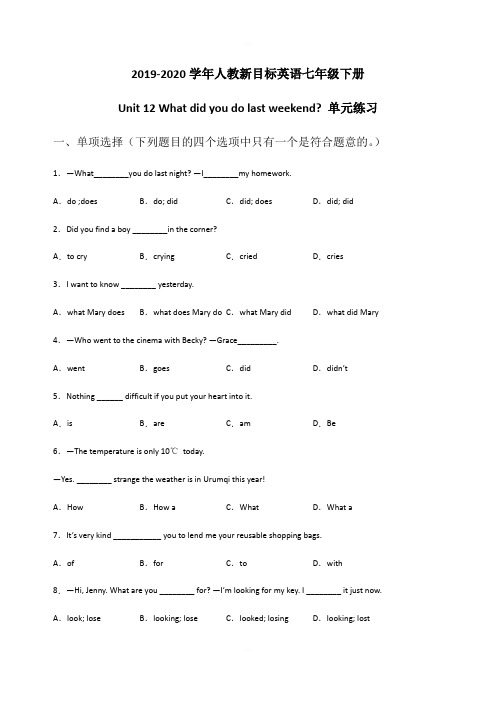
2019-2020学年人教新目标英语七年级下册Unit 12 What did you do last weekend? 单元练习一、单项选择(下列题目的四个选项中只有一个是符合题意的。
)1.—What________you do last night? —I________my homework.A.do ;does B.do; did C.did; does D.did; did 2.Did you find a boy ________in the corner?A.to cry B.crying C.cried D.cries3.I want to know ________ yesterday.A.what Mary does B.what does Mary do C.what Mary did D.what did Mary 4.—Who went to the cinema with Becky? —Grace_________.A.went B.goes C.did D.didn’t 5.Nothing ______ difficult if you put your heart into it.A.is B.are C.am D.Be6.—The temperature is only 10℃today.—Yes. ________ strange the weather is in Urumqi this year!A.How B.How a C.What D.What a7.It’s very kind ___________ you to lend me your reusable shopping bags.A.of B.for C.to D.with 8.—Hi, Jenny. What are you ________ for? —I’m looking for my key. I ________ it just now. A.look; lose B.looking; lose C.looked; losing D.looking; lost9.Our teacher told us it’s important ________ a second language.A.learn B.learning C.to learn D.learned10.—________ did you play with? —I played with my father.A.When B.How C.Who D.What11.—What do you do? —I work ________ an English teacher in a middle school.A.for B.as C.at D.to12.—________? —I camped by the lake with friends.A.What do you usually do on weekends B.Where do you goC.How was your summer vacation D.What did you do last weekend13.—Who went to the library with you yesterday? —________ .A.Tony does B.Tony is C.Tony did D.Tony doing14.We put up our tents and ________ a fire ________ us warm.A.make; keeping B.made; kept C.made; to keep D.making; to keep15.________ is very difficult ________ such a high mountain.A.This;to climb B.It;to climb C.This;climbing D.It;climbing二、完型填空Jim started painting when he was three years old and when he was five, he was already very good at it. He 16 many beautiful and interesting pictures, and people paid a lot of money for them. They said, “This boy is going to be 17 when he grows up, and then we’re going to sell these pictures for a lot more 18 .”Jim’s pictures were different 19 other people’s works, because he 20 painted on all of the paper. He painted on half of it, and the other half was always empty.“That’s very clever,” everybody said. “Nobody else does that like 21 !”One day, somebody bought one of Jim’s pictures and then said to him, “Please 22 me, Jim. Why do you paint on the bottom half of your paper, 23 not on the top half?”“Because I’m small,” Jim said, “and my brushes don’t 24 very high. That’s 25 I only paint on the bottom half of the paper.”16.A.painted B.bought C.found D.lost17.A.pretty B.funny C.famous D.lucky18.A.houses B.gifts C.food D.money19.A.of B.from C.in D.with20.A.ever B.already C.never D.with21.A.him B.us C.her D.them22.A.tell B.advise C.promise D.believe23.A.and B.but C.or D.because24.A.lie B.stand C.climb D.reach25.A.when B.where C.why D.what三、阅读理解Mr. and Mrs. Green lived in a big city, and one summer they went to the country(农村)for their holiday. They enjoyed it very much, because it was a quiet, clean place.One day they went for a walk early in the morning and met an old man. He lived on a farm, and he was sitting in the warm sun in front of his house. Mr. Green asked him, “Do you like to live in this quiet place?”The old man said, “Yes, I do,” Mr. Green said, “What are the good things about it?”The old man answered, “Well, the people here know each other. They often come and visit me, and I often goand visit them. And there are also lots of children here.”Mr. Green said, “That’s interesting. And what are the bad things?”The old man thought and thought and then said, “Well, the same things, are they?”26.Mr. and Mrs. Green _______ the country very much, because it was a quiet clean place. A.liked B.like C.lived D.live 27.One day they _____ for a walk early in the morning.A.went to B.went out C.went up D.went down 28.The old man ________ enjoyed the country.A.too B.very C.also D.much 29.The people in the country are very ________.A.friend B.friendly C.clever D.careful 30.The old man thought _______ and then said, “Well, the same things, are they?”A.quickly B.quietly C.hard D.Soon四、用括号内所给单词的适当形式填空。
人教新目标版英语七年级下册《What time do you go to school》导学案4

What time do you go to school一.预习目标:知识与能力1. 识记一些重要词汇: up,get up,dress,get dressed,brush,Tooth(teeth),shower, take a shower, usually, forty2.理解并掌握下列句型:1.A:What time do you get up?B:I usually get up at six thirty.二、预习重点:熟练掌握What time……引导的句型。
三、预习难点:Listening practice and make up new conversations.四、预习任务:(一)预习内容:任务一:写出下列单词或短语。
1.向上________________2.起床,站起________________________3.穿衣服____________________4.穿上衣服________________________________5.刷,刷净____________(复数_________________)6.牙齿_______________(复数)______________7.淋浴______________8.通常地_________________9.洗淋浴________________________________10.四十___________________________________11.去上学_______________________________12.刷牙____________________________________ 13.吃早饭_______________________________13.在六点半________________________________任务二:想一想,这些句子该如何表达?1.你几点起床? ___________________________________________________?我在六点起床。
七年级英语下册Unit2Whattimedoyougotoschool说课稿新版人教新目标版

Unit 2 What time do you go to school一、说教材(一)教材分析:1、教材简析:人教版《新目标英语》七年级下册第二单元中心话题是通过对日常生活作息时间的谈论,让学生学会时间的表达法.主要学习用what time和when来引导的特殊疑问句询问时间的标准用法,还有不同时间段的表达法以及表示频率副词的学习。
通过本单元的学习使学生学会不同时间段的表达法,学会用频率副词谈论自己日常生活习惯.通过对不同时间段的系统学习和理解,学会调整和安排自己的学习和课外活动时间,能够运用所学知识对某一活动进行合理的安排;使学生深刻理解时间的重要性,学会珍惜时间,并逐步养成良好的作息习惯.2、教学目标(知识目标、能力目标、德育目标)知识与能力:(1)掌握Section A 1a—2c和Section B 2a出现的单词和短语:time, what time, usually, get up, go to school, go home, shower, take a shower, do one’s homework, go to bed(2)掌握运用重点句型:What time do you usually get up; I usually get up at six o’clock/six thirty。
What time does she/he usually get up; She/He usually gets up at six o'clock/six thirty.过程与方法:通过运用英语正确表达时间和谈论日常作息安排,提高学生的综合语言运用能力。
情感、态度与价值观:通过学习,使学生充分认识时间的重要性,让学生养成良好的作息习惯和培养学生珍惜时间的优良品质。
确立教学目标的依据:以《英语课程标准》为理论依据,通过听、说、读、写四项基本语言技能的训练,激发学生的学习兴趣,帮助学生树立自信心和建立学习成就感,使他们在语言学习实践过程中发展综合运用能力.此外,根据教学内容,把培养学生的情感融化到日常教学当中。
人教版新目标七年级下学期Unit-12--what-did-you-do-last-weekend--知识点

Unit 12 what did you do last weekend?Section A 知识讲解一. last(1)last形容词“最后的,最末的”或者“紧接前面的,刚过去的”。
Today is the last day in the year.最后一天。
I didn’t sleep well last night. 昨晚(2)last副词,“最后地”,I’m the last one.最后一个。
(3)last 动词,“持续,继续,维持”等,The hot weather lasted a week.持续了一周。
二. camp(1)camp 动词,“扎营,搭帐篷”。
We go camping every summer.We walked all day and camped by a river at night.(2)camp 名词,“露营地,度假营”。
Let’s go back to the camp, it’s getting dark. 让我们回营地吧,天黑下来了。
根据汉语提示填空。
(1)When did you join the ______ ______ (夏令营)?(2)I like ______ ______ (去宿营)in the open air.3)We______(宿营)in the forest last night. (4)Let’s go back to the ______(营地)三. sheepsheep 可数名词,“绵羊”,复数还是sheep;goat指山羊。
How many sheep are there on your farm? 你们农场里有多少只羊?拓展:常见的单复数同形的名词还有:deer (鹿),fish (鱼),Chinese (中国人),Japanese(日本人)等。
四. byby介词, “在……旁边”,相当于beside。
Our teacher is sitting by the window.by与交通工具名词连用时,名词前不用冠词,意为“乘、坐、用”等。
新目标(Go for it)版七年级英语下册各单元知识点总结
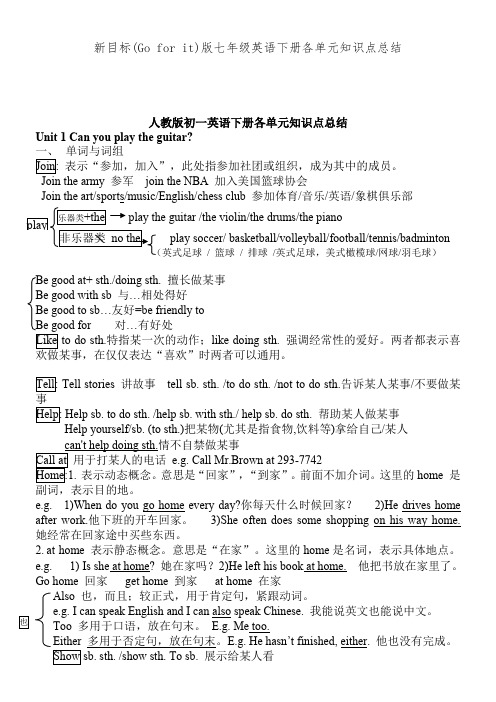
新目标(Go for it)版七年级英语下册各单元知识点总结人教版初一英语下册各单元知识点总结Unit 1 Can you play the guitar?一、 单词与词组表示“参加,加入”,此处指参加社团或组织,成为其中的成员。
Join the army 参军 join the NBA 加入美国篮球协会Join the art/sports/music/English/chess club 参加体育/音乐/英语/象棋俱乐部play soccer/ basketball/volleyball/football/tennis/badminton / 篮球 / 排球 /英式足球,美式橄榄球/网球/羽毛球)Be good at+ sth./doing sth. 擅长做某事Be good with sb 与…相处得好Be good to sb …友好=be friendly toBe good for 对…有好处特指某一次的动作;like doing sth. 强调经常性的爱好。
两者都表示喜讲故事 tell sb. sth. /to do sth. /not to do sth.告诉某人某事/不要做某帮助某人做某事Help yourself/sb. (to sth.)把某物(尤其是指食物,饮料等)拿给自己/某人e.g. Call Mr.Brown at 293-7742意思是“回家”,“到家”。
前面不加介词。
这里的home 是e.g. 1)When do you go home every day?你每天什么时候回家? 2)He drives home after work.他下班的开车回家。
3)She often does some shopping on his way home. 她经常在回家途中买些东西。
2. at home 表示静态概念。
意思是“在家”。
这里的home 是名词,表示具体地点。
人教新目标七年级英语下册课堂笔记Unit 2 What time do you go to

Unit 2 What time do you go to school?2012版人教新目标七年级英语下册课堂笔记1. upadv. 向上n 反义词:down nget up起床nstand up起立Please lift your head up.2. dress v. 穿衣服n. 连衣裙n复数:dressesn get dressed穿上衣服My daughter is too young to dress herself.3. brush v. 刷;刷净n. 刷子n 复数:brushes n 单三: brushes nwipe擦nsweep扫nrub摩擦nscrape刮掉You have to brush your shoes now.4. toothn. 牙齿n 复:teeth nbrush teeth刷牙ntoothpick牙签ntoothpaste牙膏ntoothbrush牙刷The baby has two teeth.常见的可数名词单数变复数时不规则变化的名词有: man, woman, child, foot, mouse, tooth 等。
我们可以用这样一句话来记忆这些单词“男女孩子的脚踩住老鼠的牙”5. shower n. & v. 淋浴,(名)淋浴器n 近: bath 洗澡,沐浴ntake/have a shower洗澡nshower下阵雨,倾注;阵雨,大量倾泻nshow给……看You’d better take a shower.6. usually adv. 通常地,一般地Do you usually go to the park?n unusually异乎寻常地7. fortynum. 四十n 表示“几十”的数字都以-ty结尾。
n词形特殊的有:twenty, thirty, forty, fifty, eighty.nfour四nfourteen十四There are 40 students in Class One.8. never adv. 从不; 绝不n Better late than never.迟做总比不做好。
(完整版)新人教版英语七年级下册1-12单元知识点归纳

Unit 1 Can you play the guitar?语言点梳理一、语法:情态动词:有一定意义,表示说话人的语气或情态,但不能单独作谓语,只能和其他动词原形一起构成谓语,没有人称和数的变化。
否定形式是在情态动词后面加上not。
变一般疑问句要把情态动词提到句子的开头,即:情态动词+主语+动词原形+其他?1.肯定句:He/She/I/We/They/You/Tom+情态动词can+动词原形.2.否定句:He/She/I/We/They/You/Tom+情态动词can+not+动词原形3.一般疑问句:情态动词can+ He/She/I/We/They/You/Tom+动词原形?Yes,主语+can./No,主语+ can’t.1)表示能力,“会;能”。
eg: Can you dance? 你会跳舞吗?2)表示请求或许可,“可以”。
eg: Can I ask you a question? 我可以问你一个问题吗?1. play the guitar/piano/violin/drums弹吉他/钢琴/小提琴/敲鼓play chess下象棋play sports 做运动play soccer/basketball踢足球、打篮球(乐器名称前加the,球类名称前不加the)2. join the art club加入艺术俱乐部/swimming club游泳俱乐部sports club运动俱乐部/story telling club讲故事俱乐部English club/ art club/ music clubjoin v.参加,加入指加入某个团体,组织,群体,并成为其中的一员。
What club do you want to join ?你想加入什么俱乐部?I want to join the swimming club.=I want to be in the swimming club.takeEg. take part in the meeting参加会议3. want sth.想要某物want to do sth.想做某事want sb to do sth 想要某人做某事4. be good at(doing...)擅长于=do well in 在某方面做得好be good with与…相处的好be good for对…有益5. like to do sth.喜欢做某事like doing sth.6. Let’s do sth.让我干…let/make sb.do sth.使某人做某事10. write stories写故事write to sb= write a letter to sb= write sb a letter11.tell /speak/say/talk的用法1) tell讲述一件事实或故事等及物动词tell sb. sth 给某人讲某事=tell sth to sb 把某事告诉某人tell sb. to do sth 告诉某人做某事tell stories讲故事=tell a story tell a lie撒谎2)speak v. 主要是讲说话的能力,往往接语言speak English讲英语3)talk 为不及物动词往往加介词再接宾语talk to sb.和…交谈/talk with sb.和…交谈(指双方)4)say往往接说话的内容eg.Our teacher says we should study hard.say it in English用英语说它12. make friends with sb.和…交朋友13. play games with sb.和…做游戏14. help sb. with sth.= help sb. (to) do sth.帮助某人做某事15. call sb. at +电话号码给某人打电话拨+号码16. on /at the weekend 在周末on weekends after school放学后17.do Chinese kung fu 打中国功夫18.be free 空闲的19. sing very well 唱得好That sounds good. 那听起来很好20.English-speaking students 讲英语的学生学生运动中心23.also /too/eitheralso/too用在肯定句,also 用于句中,too 用于句尾,either用于否定句句未eg. I am a student . He is a student,too. I am a student . He is also a student.I am not a student . He is not a student, either.24.and/or 连接两个并列成分eg.I can sing and dance.(and用于肯定句)I can’t sing or dance.(or用于否定句)Can you sing or dance ?(or用于选择疑问句“或者”)25.at27. need to do sth需要干某事need sb. to do sth 需要某人干某事28.wanted students for School show学校表演招聘学生v.展示;给….看… show sb. Sth= show Sth to sb.给某人展示n.节目;表演TV show电视节目29.teach v.教,讲授teacher n.教师teach sb.English教某人英语teach sb. sth .= teach sth to sb.教给某人某事=教某事给某人teach sb.to do sth教给某人做某事30.music n.音乐musician n. 音乐家31.piano (pl.) pianosUnit 2 What time do you go to school?知识点梳理1.What time do you get up?What time +助动词do/does +主语+动词原形,询问某人做某事的具体时间。
七年级英语下册《Unit2 What time do you go to school Period 2》人教新目标版

七年级下册Unit2 What time do you go to school? 导学案 Period2【学习目标】1.知识目标:巩固表示日常作息的词汇。
2.技能目标:熟练表达自己一天作息情况。
3.情感目标:培养学生良好的生活习惯。
【学习重难点】熟练掌握表达一天作息的句型。
【学习过程】:一、自主复习1.试翻译下列句子。
你每天什么时候起床?______________________________________________我每天六点穿衣。
___________________________________________________她每天六点十分刷牙。
______________________________________________他总是七点半吃早饭。
______________________________________________他每天晚上八点洗澡。
______________________________________________二、对话练习听2d录音跟读模仿。
Pair work 两人展示:Interviewer: Scott has an interesting job. He works at a radio station.Scott, what time is you r radio show?Scott: From twelve’s o’clock at night to six o’clock in the morning. Interviewer: What time do you usually get up?Scott: At eight thirty at night. Then I eat breakfast at nine. Interviewer: That’s funny time for breakfast.Scott: Yeah. After that, I usually exercise at about ten twenty. Interviewer: When do you go to work?Scot t: At eleven o’clock, so I’m never late for work.Group work: 小组合作:调查本组内成员信息,展示调查结果。
人教版七年级英语下册Unit_2_What_time_do_you_go_to_school试题及重点知识

Unit 2 What time do you go to school? 单元大归纳短语归纳what time 几点go to school 去上学get up 起床take a shower 洗淋浴take a walk 散步brush teeth 刷牙get to 到达do homework 做家庭作业eat breakfast 吃早饭go to work 去上班go home 回家get home 到家either…or… 要么…要么… at night 在晚上get dressed 穿上衣服in the morning/ afternoon/ evening 在上午/下午/晚上be late for 迟到go to bed 上床睡觉lots of 许多,大量radio station 广播电台用法集萃at + 具体时间点在几点(几分)eat breakfast/ lunch/dinner吃早饭/午饭/晚饭from …to …从……到……thirty\half past +基数词……点半fifteen\a quarter to +基数词差一刻到……点need to do sth 需要做某事典句必背1. What time do you usually get up? I usually get up at six thirty.2. That’s a funny time for breakfast.3. When do students usually eat di nner?4. In the evening, I either watch TV or play computer games.5. At twelve, she eats lots of fruit and vegetables for lunch..6. She knows it’s not good for her, but it tastes good.7. Here are your clothes.unit2 巩固练习Ⅰ. 用适当的词填空,补全下面的短文。
人教版新目标版七年级英语下册 Unit 2 What time do you go to school教案
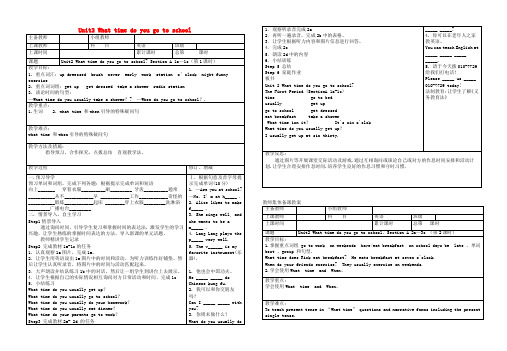
7. 3a: Use“always”,”usually”, or“never”to make sentences.
8. 3b :Let students write about something they do.
Step3 3c :1.make an interview 2. write a short passage
What time do you usually eat dinner?
What time do your parents go to work?
Step3 完成教材2a- 2d 的任务
1.观察听录音完成2a
2.再听一遍录音,完成2b中的表格。
3.让学生根据听力内容和图片信息进行回答。
4.完成2c
5.朗读2d中的内容
2. 重点词词组:get up get dressed take a shower radio station
3. 谈论时间的句型:
—Whattimedo youusuallytake a shower?? —When do you go to school?.
教学重点:
1.生词 2. what time 和when引导的特殊疑问句
1. 他也会中国功夫。
He__________do Chinese kung fu.
2. 我可以和你交朋友吗?
Can I__________with you?
3. 你周末做什么?
What do you usually do__________?
4. 你可以在老年人之家教英语。
You can teach English at____________________.
新目标人教版英语七年级下册Unit 12 What did you do last weekend?单元过关试题及答案

Unit 12单元过关卷时间:100分钟满分:120分第Ⅰ卷听力部分(20分)Ⅰ. 关键词语选择(共5小题;每小题1分,满分5分)1. A. luck B. park C. lake2. A. tired B. afraid C. scared3. A. sheep B. snake C. sleep4. A. walk B. work C. wake5. A. stay up B. cut up C. put upⅡ. 短对话理解(共5小题;每小题1分,满分5分)6. What will they do?A B C7. What did Eric do last Saturday?A B C8. What did Jeff see by the river yesterday?A B C9. What is the boy doing?A B C10. How did Dale go to the cinema last weekend?A B CⅢ. 长对话理解(共5小题;每小题1分,满分5分)听下面一段对话,回答第11、12小题。
11. What is Peter doing now?A. Reading a storybook.B. Watching TV.C. Reading a newspaper.12. Where did Peter go last Monday?A. To the beach.B. To the library.C. To the bookstore.听下面一段对话,回答第13至15小题。
13. Where did Jack live in childhood?A. In the city.B. In the countryside.C. In the town.14. Who helped Jack with his studies?A. His uncle and aunt.B. His teachers.C. His parents.15. How many rooms did the house have?A. Five.B. Six.C. Seven. Ⅳ. 信息转换(共5小题;每小题1分,满分5分)第Ⅱ卷笔试部分(100分)Ⅴ. 单项填空(共10小题;每小题1分,满分10分)21. —My friends and I will go fishing today.—________A. My pleasure.B. Thanks a lot.C. Have a nice day!D. Nice to meet you.22. Robinson Crusoe made a fire ________ the meat.A. to cookB. cookC. cookingD. cooked23. —Our classmates are going to Fantawild Adventure(方特欢乐世界)after the exams.—________ exciting idea!A. WhatB. What anC. How anD. How24. —What do you think of English?—It's a useful ________, so we must learn it well.A. questionB. languageC. messageD. problem25. —Is ________ OK?—Yes, I get on well with my classmates and I like my school life.A. somethingB. anythingC. everythingD. nothing26. —Was your mother busy yesterday?—Yes, she was. She ________ the house all day.A. cleansB. is cleaningC. will cleanD. cleaned27. —What were the students doing when you came into the classroom?—I saw them ________ games.A. playB. to playC. playingD. played28. —How was your trip?—________. I had a good time camping in the forest.A. It was greatB. It was terribleC. That sounds greatD. Lucky you29. —Jenny, please come here and help me ________ the tent.—OK. I'm coming.A. put upB. cut upC. put onD. cut down30. —I was surprised to see you at the library so early in the morning.—________, huh?A. Every dog has its dayB. East or west, home is the bestC. Where there is a will, there is a wayD. The early bird catches the wormⅥ. 完形填空(共10小题;每小题1. 5分,满分15分)Hello! I'm in Sanya now. My parents and I arrived here ________(31)plane yesterday. My uncle met us at the airport (机场). We were a little ________(32), so we had a rest after we arrived at my uncle's home.Yesterday evening, we had dinner in a Chinese ________(33). The food was delicious there. After dinner, my cousin and I watched a(n) ________(34) soccer game on TV, because soccer is our favorite sport. When I ________(35) this morning, it was 7 o'clock. After breakfast, my family and I went to the beach. We swam in the sea and played volleyball on the beach________(36). We had a great time there. This afternoon, we ________(37) a walk along a busy street. There were many shops on both sides of the street. I loved this kind of street________(38) the shops sold all kinds of things at very good prices. I ________(39) some gifts for my friends.Now we're camping by a lake. My parents are putting up________(40). We will spend a good night here. How relaxing it will be!31. A. on B. for C. by D. with32. A. tired B. lucky C. happy D. scared33. A. bank B. restaurant C. library D. hospital34. A. lazy B. strict C. quiet D. exciting35. A. put up B. stayed up C. woke up D. got lost36. A. luckily B. early C. usually D. happily37. A. spent B. took C. kept D. crossed38. A. or B. so C. but D. because39. A. bought B. told C. showed D. left40. A. trees B. pictures C. tents D. clothesⅦ. 补全对话(共5小题;每小题1分,满分5分)A:Hello, Helen! What did you do last weekend?B: (41)________A: (42)________B:We played badminton.A:That sounds interesting. (43)________B:It was sunny.A:But it was rainy in my town.B: (44)________A:It was boring. I didn't want to do anything.B:Oh! (45)________ See you.A:Bye.A. How was the weather in your town?B. I have to go.C. I went there with my parents.D. What did you do?E. Who did you go there with?F. Well, I visited my friend.G. How was your weekend?Ⅷ. 阅读理解(共15小题;每小题3分,满分45分)AThis happened (发生) about two years ago. I went to an art festival in France with my friends. The festival would last (持续) five days.When we arrived, the weather was great. It was very hot and sunny, so we went to the mountains for camping. But in the mountains the weather changed (变化) quickly. That night there was a terrible storm. At first we didn't worry about it, but itinto the tent. In the end, we had to leave and take our things to a hotel. There weren't any free rooms, so they let us sleep in the dining room. The next morning, it was sunny again. But our tent wasn't there. The wind blew it away at night.46. Where did the writer go for the art festival?A. To China.B. To the UK.C. To the USA.D. To France.47. The underlined word “storm” means ________ in Chinese.A. 暴风雨B. 雨夹雪C. 冰雹D. 大雾48. Where did the writer sleep that night?A. At home.B. In a hotel.C. In the tent.D. At a friend's home.49. Which of the following is TRUE?A. The art festival was one week long.B. The writer didn't enjoy the camping.C. The writer couldn't find his bag the next morning.D. The bad weather in the mountains lasted two days.BHere are some of John's diaries(日记).50. What was the weather like on Saturday?A. Fine.B. Cloudy.C. Rainy.D. Snowy.51. What did John have for lunch on Sunday?A. Some rice and vegetables.B. Some hamburgers and bread.C. A bowl of noodles and some chicken.D. Two hamburgers and some vegetables.52. John stayed at the hotel on Sunday because ________.A. it rained that dayB. he didn't like to go outC. he liked watching TV thereD. he wanted to have a good sleep53. Which of the following is TRUE?A. It was windy and cool on Friday.B. John went to Tian'anmen Square himself.C. John thought teaching the children to swim was fun.D. John watched an interesting movie on Sunday evening.CDean could plant (种植) apple trees well. He often gave other people apples. One day, Dean gave John a young apple tree. He told John, “You can take it home and plant it, and then you can get many apples. ”John was very happy. But when he got home, he didn't know where to plant the young apple tree. He was afraid that if he planted the tree near the street, strangers (陌生人) would take the fruits; if he planted the tree near his house, his neighbors would take some of the apples; if he planted the tree in his garden, his children would take the fruits.At last, he planted the apple tree in his room, so others couldn't see it. But the tree died (死了) soon. John was very sad. He told Dean about it.“Yes,” said Dean, “Others can't enjoy the fruits if you plant the tree in your roo m.54. Why did Dean give John a young apple tree?A. Because they were good friends.B. Because he had many apple trees.C. Because he didn't want to give John apples any more.D. Because he wanted John to have many apples.55. Which of the following is TRUE?A. The young apple tree died at last.B. Dean never gave apples to others.C. Dean wasn't good at planting apple trees.D. John planted the apple tree with his children.56. From the passage, we know that ________.A. John is very cleverB. John is very friendly to othersC. John only thinks about himselfD. John likes to learn from his friends57. What's the best title of this passage?A. An apple treeB. John and his friendC. How to plant treesD. How to be a good fatherD阅读下面短文,并用英语回答问题(请注意每小题后面的词数要求)。
人教版英语7年级(下册)目录及单元详解经典总结
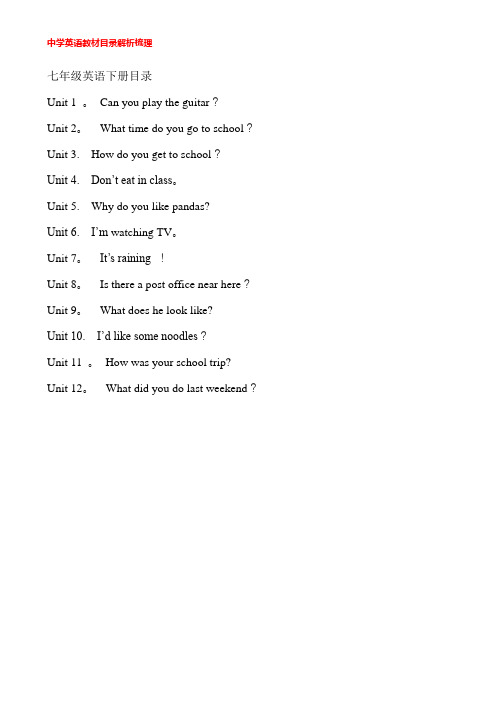
Life n。生活,生命
Rick里克(男名)
Jim吉姆(男名)
Scott斯科特(男名)
Tony托尼(男名)
重点短语
1.what time几点
2.go to school去上学
3.get up起床
4。take a shower洗淋浴
5。brush teeth刷牙
10。do kung fu练(中国)功夫
11。tell stories讲故事
12.play games做游戏
13.on the weekend/on weekends在周末
目标句型
1.Can you draw?Yes, I can. / No,I can't。
2.What club do you want to join?I want to join the chess club。
Unit 12。What did you do last weekend?
七年级下册
单元标题
Unit 1 Can you play the guitar?
单元话题
谈论活动
语法目标
情态动词can
重点
词汇
guitar n.吉他
sing v.唱;唱歌
swim v。游泳
dance v.跳舞;舞蹈
draw v。画
6。get to到达
7.do homework做家庭作业
8.go to work去上班
9。go home回家
10。eat breakfast吃早饭
11。get dressed穿上衣服
12.get home到家
13。either…or…要么…要么…
人教版七年级英语下复习Unit2 What time do you go to schoo

(2013·山东潍坊)When did the terrible earthquake happen in Sichuan? It happened_____8:02____the morning of April 20th,2013.
A.on;in B.at;on C.at;in D.on;on
go home 回家 letter n.信
around adv.大约
start v.开始;出发 write v.书写;写
tell v.告诉;讲述 me pron.我(I的宾格)
soon adv.不久
wish n.希望;祝愿
best (good,well最高级)最好的(地)
Saturday n.星期六 am (a.m.)上午 survey n.调查;考察
o’clock adv.(只用于正点)......点钟 work v.&n. 工作
hour n.小时 brush v.刷
teeth n.(tooth复数)牙齿
after 在......之后 go to work 去上班
get to 到达
bus n.公共汽车 hotel n.旅馆
all prep.全部;全体
in May in summer in 2011
介词on用在日期、星期几、节日前,也可表示具体
某一天的早上、下午、晚上等。
usually 频率副词 usually: 频度副词,意为“通常”。
在句中作状语,一般位于实义动词之前, 系动词、助动词或情态动词之后。
Eg: I usually have lunch at school.
逆读法: 借助介词past或to 。 小于等于30分钟:分钟+past+小时 几点过几分
人教版七年级英语下册Unit 2 What time do you go to school知识点归纳总结

Unit 2 What time do you go to school?◆短语归纳1. what time 几点2. go to school 去上学3. get up 起床 go to bed 上床睡觉(反义词get up )4. take a shower = have a shower 洗淋浴5. brush teeth 刷牙6. get to 到达7. do homework 做家庭作业 8. go to work 去上班(反义词 go home )9. go home 回家 10. eat breakfast 吃早饭 11. get dressed 穿上衣服12. get home 到家13. either…or… 要么…要么… 14. make breakfast 做早饭15. in the morning/ afternoon/ evening 在上午/下午/晚上 16. take a walk 散步17. lots of=a lot of 许多,大量 18. radio station 广播电台 19. at night 在晚上20. be late for=arrive late for 迟到21.make a shower schedule 做一个洗澡的安排22. have breakfast/dinner/lunch 吃早晚午饭 23.get to work 到达工作岗位24.practice guitar 练吉它25.leave home 离家26.go to class 上课27.take the Number 17 bus to the Hotel 乘17路公共汽车去旅馆◆用法集萃 ◆典句必背 1. What time do you usually get up? I usually get up at six thirty. 2. That’s a funny time for breakfast. 3. When do students usually eat dinner? They usually eat dinner at a quarter to seven in the evening.4. In the evening, I either watch TV or play computer games.5. At twelve, she eats lots of fruit and vegetables for lunch..6. She knows it’s not good for her, but it tastes good.7. Here are your clothes.◆语法1. at + 具体时间点 在几点(几分)2. eat breakfast/ lunch/dinner 吃早饭/午饭/晚饭3. thirty\half past +基数词 ……点半4. fifteen\a quarter to +基数词 差一刻到……点5. take a/an +名词 从事……活动6. from …to … 从……到……7. need to do sth 需要做某事8.around six o’clock 六点左右9.tell sb. about sth. 告诉某人某事 tell sb. to do sth. / tell sb. Sth. 10.know about sth. 知道某方面的情况 11.love to do/doing = like to do/doing 喜欢干某事 12.Listen to the early morning news on radio 听电台早间新闻 13.watch the early morning news on TV 看电视早间新闻1、英语时间的表达(1)整点时间可表示为“钟点数+o’clock”或直接读钟点数,省去o’clock。
人教版新目标七年级英语下册Unit2Whattimedoyougotoschool语法篇试题含答案

人教版新目标七年级英语下册Unit2Whattimedoyougotoschool语法篇试题学生通过本讲学习,能够掌握本单元的重点语法,并在综合能力上有一定的拓展。
一、what time与when1.what time翻译为“几点”问的是具体的时间,一般回答要具体到小时。
What time do you go to school?你什么时候/几点上学?I go to school at half past seven o’clock.我七点半去上学。
回答具体到点钟,且注意在几点前边的介词用at。
2.when也是对时间的提问,但与what time的区别是:用when提问,回答既可以是具体的时间,也可以是不具体的时间,如:in the morning,last year,in 1998等范围大的时间,例如:When does he take a shower?他什么时候洗澡?He takes a shower in the morning.他在早上洗澡。
也可用具体时间:I take a shower at 6 o’clock in the morning.我早上六点洗澡。
3. 问对方时间点只能用what time,如What time is it?二、频率副词的使用用法几个频率副词的用法★alwaysalways 意为“总是”,与进行时态连用时,可以表示赞扬,也可以表示讨厌等感情色彩。
e.g.(1)I shall always remember my first day at school. 我将永远记住我上学的第一天。
(2)He is always smoking. 他总是抽烟。
★usuallyusually可以指通常的动作,但是侧重已经形成的习惯,它是从已经形成的角度来说明动作。
e.g.(1)I usually do some shopping with my parents on Sundays. 我经常在星期天和我的父母一起去买东西。
2012【新】人教版新目标七年级下英语Unit_2_What_time_do_you_go_to_school__练习题含答案
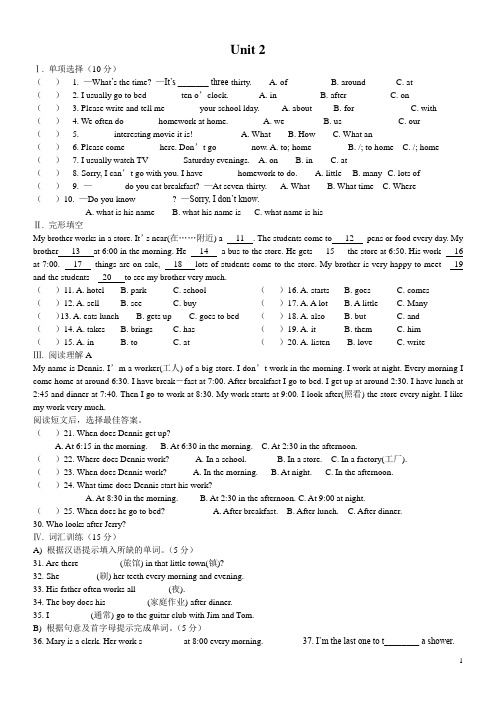
Unit 2Ⅰ. 单项选择(10分)() 1. —What’s the time? —It’s _______ three-thirty. A. of B. around C. at() 2. I usually go to bed _______ ten o’clock. A. in B. after C. on() 3. Please write and tell me _______ your school lday. A. about B. for C. with() 4. We often do _______ homework at home. A. we B. us C. our() 5. _______ interesting movie it is! A. What B. How C. What an() 6. Please come _______ here. Don’t go _______ now. A. to; home B. /; to home C. /; home()7. I usually watch TV _______ Saturday evenings. A. on B. in C. at()8. Sorry, I can’t go with you. I have _______ homework to do. A. little B. many C. lots of()9. —_______ do you eat breakfast? —At seven-thirty. A. What B. What time C. Where()10. —Do you know ________? —Sorry, I don’t know.A. what is his nameB. what his name isC. what name is hisⅡ. 完形填空My brother works in a store. It’s near(在……附近) a 11 . The students come to 12 pens or food every day. My brother 13 at 6:00 in the morning. He 14 a bus to the store. He gets 15 the store at 6:50. His work 16 at 7:00. 17 things are on sale, 18 lots of students come to the store. My brother is very happy to meet 19 and the students 20 to see my brother very much.()11. A. hotel B. park C. school()12. A. sell B. see C. buy()13. A. eats lunch B. gets up C. goes to bed ()14. A. takes B. brings C. has()15. A. in B. to C. at ()16. A. starts B. goes C. comes ()17. A. A lot B. A little C. Many ()18. A. also B. but C. and ()19. A. it B. them C. him ()20. A. listen B. love C. writeⅢ. 阅读理解AMy name is Dennis. I’m a worker(工人) of a big store. I don’t work in the morning. I work at night. Every morning I come home at around 6:30. I have break-fast at 7:00. After breakfast I go to bed. I get up at around 2:30. I have lunch at 2:45 and dinner at 7:40. Then I go to work at 8:30. My work starts at 9:00. I look after(照看) the store every night. I like my work very much.阅读短文后,选择最佳答案。
- 1、下载文档前请自行甄别文档内容的完整性,平台不提供额外的编辑、内容补充、找答案等附加服务。
- 2、"仅部分预览"的文档,不可在线预览部分如存在完整性等问题,可反馈申请退款(可完整预览的文档不适用该条件!)。
- 3、如文档侵犯您的权益,请联系客服反馈,我们会尽快为您处理(人工客服工作时间:9:00-18:30)。
Unit 12 What time do you go to school(第4课时)目标1. Vocabulary(单词):. 熟练掌握第71、72页的生词和短语;2. Structure(句型):1) 复习掌握P70中1c听力材料中的重要句子;2) 熟练掌握P71中2b中重要句子。
3. Grammar(语法): 运用过去时描写自己的旅行.重难点1.学习并掌握词汇:high, ago, India, moon, surprise, snake, move, start, jump, wake, into, forest, ear2.学习目标语言:学会对自己的旅行进行描述.3.情感态度目标:交流旅行见闻,增加阅历。
授课类型新授课授课内容Section B 2a-self check五环教学流程与设计我的修改自主学习(课前预习) (一)预习指导:学生通过以下方式进行预习:利用人机对话、磁带、光碟、网络、拼读法等听懂、读会单词、单词和句子;通过以往的旧知识或借助同步教材全解,预习领会新的单词、短语及句子等用法)1.复习单词和短语:认真复习Unit 12单词表中P71-72的单词和短语以及导学3,预习中的短语和句子.完成一项就在后面√1)认真反复听(3遍) ________ ;2)认真反复跟读(3遍)________;3)请根据中文意义默写出对应的英文单词:_______________飞________,_________, 风筝__________, 高的(地)____________, 以前________,印度____________, 月亮____________,惊奇,使吃惊_______________,蛇__________,移动___________,开始,着手___________,跳跃____________,醒来_____________,到···里____________, 森林____________,耳朵________★帐篷__________, ★惊慌的__________,★消防队员____________’4)请根据中文意义默写出对应的英文词组:_______________ 1.放风筝, 2.中学, 3.举起抬起 ,★4.吃惊 ,5.对。
大声喊叫 , 6.上上下下 ,7.把。
弄醒 ,8.唱歌并弹吉他 ,9.为考试学习, 10.和朋友吃饭 ,★11.在游泳池游泳, 12.呆在家里 ,13.很忙, 14.有许多事情做 ,15.不那么有趣, 16.不太糟糕 ,17.度过令人放松的时间,18.玩得高兴,19.消防队,2.短语:短语的预习方式和单词的预习方式大致相同,先在书上找到每个短语出现的具体位置,尝试着准确地拼读好每个短语中的每个单词,再把每个短语整体反复读,不会的再在人机对话或其它听力设备中去听读、跟读,直到会读会写为止。
完成一项就在后面√1) 在书上找到以下短语出现的位置,用红笔等自己喜欢的颜色的笔勾画出来________2)认真反复听以下短语(3遍) ________ ;3)认真反复跟读以下短语(3遍)________;预习此处的短语:( )1.a weekend to remember, ( )2.finish high school, ( )3.as a special gift, ( )4.take us to India, ( )5.a small village in India, ()★6.take a long bus ride to.., ( )7.put up our tents, ( )8.make a fire, ( )9.keep us warm, ( )10.on the first night, ( )11.tell each other stories, ( )12.go to sleep early, ( )13.the next morning,( )14.look out of …, ()★15.a big snake sleeping near the fire, ( )16.know about…, ()17.start to do sth , ( )★18.snake can feel things moving, ( )19.a useful lesson for me,( )20.clean my room, ( )21.a little difficult,( )22.a book about history, ( )23.an interesting talk show4)请尝试把以上短语的中文意思填入相应的括号内, 正确配对(不会的,翻书或同步教材全解找答案,用红笔订正出来,还有不会的,认真听同学或老师评讲;打★的为拓展的短语,选作,鼓励同学们通过预习,猜测词义或查阅相关资料,其中不认识的单词一定要查阅词典,注上音标):________A.带我们去印度,B.难以忘怀的周末,C.印度的一个小村庄,D.完成了中学学业,E.作为一件特别的礼物,F.乘长途汽车去。
,G.一条大蛇睡在火堆旁,H.搭起我们的帐篷,I.在第一天晚上,J. 生火, K.彼此讲故事,L.保持我们暖和,M.从。
看出去,N.早早睡觉,O.第二天早上,P.一次有趣的谈话节目,Q.了解,R.一本关于历史的书,S.开始做。
,T.有点困难,U.蛇能感觉到物体移动,V.我的一次有益的教训,W.打扫我的房间3.句子和对话 : 请认真 P71 ,72的文章,尤其听读下面的重点句子,了解其汉语意思,并尝试着将汉语和英语配对。
(打◆的为重难点句子;打★为拓展的句子,其它为基础的基本句型,请同学们根据自己的情况,尽力完成目标和任务)1). 认真听读对话及句子(3遍)________;2). 英语和汉语配对 __________;( )◆1.I was so scared that I couldn’t move.( )◆2.I was so tired that I went to sleep early.( )◆3.He also told me it was important not to go near asnake.( ) 4.As a special gift, our parents took us to India. ( ) 5.First, we took a long bus ride to a lake in the countryside.( ) 6.There we put up our tents and made a fire to keep us warm and cook food on.( ) 7.The next morning, my sister and I got a terrible surprise.( ) 8.When we look out of our tent, we saw a big snake sleeping near the fire.( ) 9.This woke the snake up and it moved into the forest near the lake.( ) 10.My dad told me later that snakes don’t have ears but can feel things moving.( ) 11.This was a useful lesson for me.( ) 12.I had a school trip last week.( ) 13.We watched the firefighters work.( ) 14.What an interesting job they have.( )★15.We learned how to call the fire station and what to do when there is a fire.A.作为一件特别的礼物,父母带我们去了印度。
B.我是如此的劳累以至于早早的睡了。
D.他也告诉我们不要靠近蛇是重要的。
E.我是如此惊恐以至于我不能动弹。
F.首先,我们乘坐长途汽车去了乡下的一个湖。
G.第二天早上我妹妹和我大吃一惊。
H.我们搭起我们的帐篷,生了一堆火,好让我们保持温暖,并在火上烹调食物。
I.我们了解了怎么给消防队打电话,还有当火灾发生时做什么。
J.当我们看帐篷外面时,看见一条大蛇睡在火堆旁边。
K.他们的工作多么有趣。
L.这惊醒了那条蛇,它钻进了湖边的树林。
M.我们参观了消防队员的工作。
N.后来爸爸告诉我,蛇没有耳朵但是能感受到物体移动。
O.我上周经历了一次学校旅行。
P.这对我来说是一次有益的教训。
合作学习运用(课中释疑) 1. 核对预习检查答案(Tips: A. 组内选一个学生进行呈现答案B. 老师给予评价,学生互评C. 老师针对易错点进行评讲)2. 根据课文流程授课Step1 Review & Lead-in1. Read 2b on P71 together.2. Complete the conversation. Finish Self Check: Ex.2.3. Read the conversation together.4. Finish Self Check: Ex.1: Complete the phrases. Then use some of them in the past forms to write a story.Step2 Presentation1. Look at the pictures in 3a. Ask Ss as following: X k B 1 . c o m--What did he do in Picture 1? -- He cleaned his room.--Wha t did he do in Picture…? -- He ….2. Complete the passage. Finish 3a. Then check the answers.3. Read 3a together.Step3 WritingWrite about what you did last weekend.surprise 的用法:surprise 既可作名词,也可作行为动词。
作名词时,一为“惊奇;惊讶”,常用短语有:in surprise(惊奇), get a surprise (吃惊), to one’s surprise(使某人惊讶的是)等;作动词时,意为“使……惊奇”。
